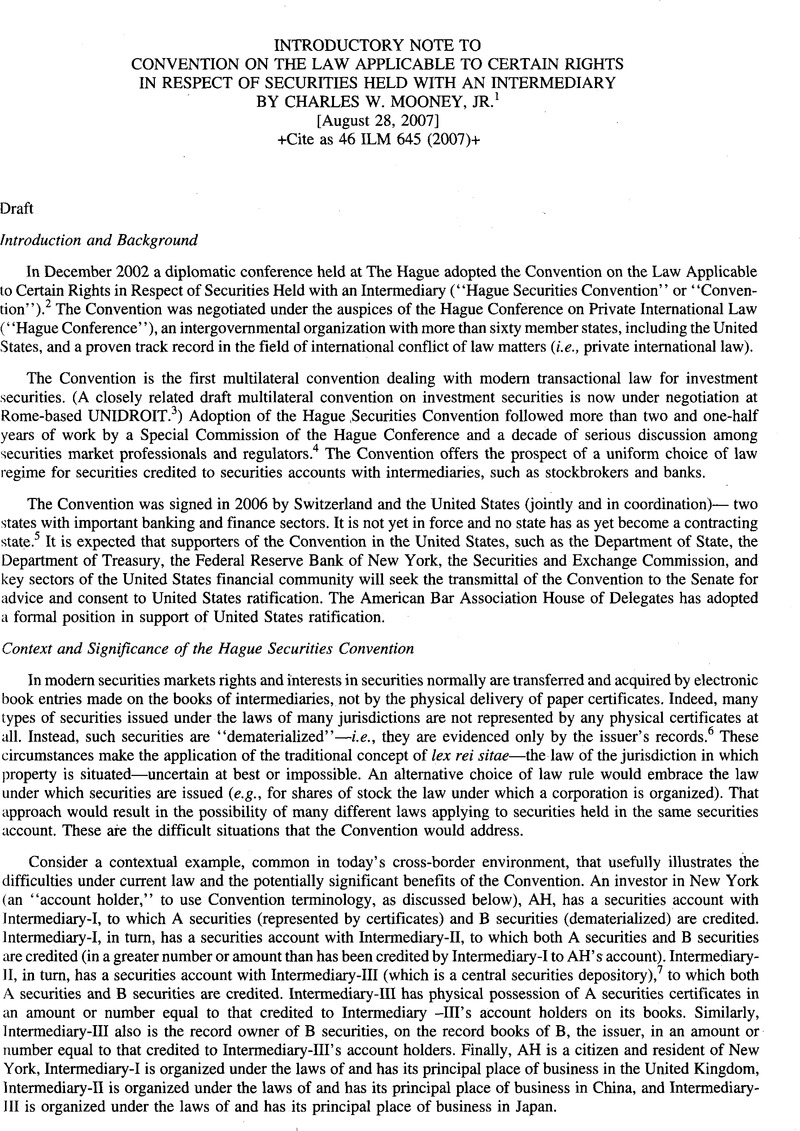No CrossRef data available.
Published online by Cambridge University Press: 27 February 2017

This text was reproduced and reformatted from the text appearing at The Hague Conference on Private International Law website (visited July 23, 2007) <http://www.hcch.net>.
1 The author would like to thank Harold Burman, Office of the Assistant Legal Adviser for Private International Law, U.S. Department of State, for thoughtful comments and suggestions on earlier drafts of this introductory note.
* This text was reproduced and reformatted from the text appearing at The Hague Conference on Private International Law website (visited July 23, 2007)<http://www.hcch.net>.
2 Hague Conference on Private International Law, Convention on the Law Applicable to Certain Rights in Respect of Securities Held with an Intermediary (2006), available at <http://www.hcch.net/index_en.php?act=conventions.text&cid=72>..The Convention was adopted at the Nineteenth Diplomatic Session held December 2-13, 2002), but its date reflects the year that it was first signed, following practice of the Hague Conference. For an overview of the Hague Securities Convention, see Rocks, Sandra M.,The Hague Convention on the Law Applicable to Certain Rights in Respect of Securities Held with an Intermediary, 36 U.C.C.L.J. 1 (2003).Google Scholar For a detailed and comprehensive treatment, see Roy Goode, Hideki Kanda,&Karl Kreuzer, Explanatory Report on the Hague Convention on the Law Applicable to Certain Rights in Respect of Securities Held with an Intermediary (2005) (“Explanatory Report”). While the indicated individuals were the principal authors, the Explanatory Report was overseen by the diplomatic conference's drafting committee. Under a resolution adopted at the diplomatic conference it serves as an official commentary. It reflects the work of numerous individuals.
3 Substantive rules concerning “intermediated securities” are currently the subject of a draft convention prepared under the auspices of UNIDROIT. See Draft Convention on Substantive Rules regarding Intermediated Securities, available at<http://www.unidroit.org/english/publications/proceedings/2007/study/78/s-78-94-e.pdf>. It is generally expected that a diplomatic conference on the draft convention will be hosted by the government of Switzerland in Geneva in June 2008.1 serve on the United States delegation for this project.
4 Explanatory Report 3&n.3.
5 Switzerland and the United States signed the Convention on July 5,2006. Hague Conference, Hague Securities Convention Status Table, available at <http://www.hcch.net/index_en.php?act=conventions.status&cid=72>. The Convention will enter into force after it has been ratified, accepted, approved, or acceded to by three states. Convention, Art. 19.
6 This is the case, for example, with respect to United States Treasury securities. See,e.g., 31 C.F.R. Part 357, Subpart B (United States Treasury securities).
7 Central securities depositories (or “CSDs”) play a crucial role in modern securities markets, although they vary considerably from state to state as to their legal relationships with issuers and other market participants. In general, CSDs that function as intermediaries (like Intermediary-Ill in the example) have as their account holders securities market participants such as securities brokers and dealers and banks.
8 The statement in the text assumes that once the applicable law is determined the applicable substantive rules of the relevant jurisdiction also could be determined and understood. The statement also assumes that all likely forum states are parties to the Convention. If the applicable substantive rules are indeterminate, of course, then to that extent uncertainty as to results would remain even after the choice of law puzzle were solved.
9 Convention, Art. 1(1)(d) (defining “account holder”).
10 Convention, Art. 1(1)(b) (defining “securities account”).
11 Convention, Art. 1(1)(a) (defining “securities”).
12 Convention, Art. 1(1)(c) (defining “intermediary”). Note that Article 1(3), (4), and (5) provide some additional gloss on persons that are or are not intermediaries for purposes of the Convention.
13 Convention, Art. 1(1)(f) (defining “securities held with an intermediary”). The analogous term under Article 8 the U.C.C. in the United States is a “security entitlement.” U.C.C. § 8-102(a)(17) (defining “security entitlement”).
14 Convention, Art. 1(1 )(g) (defining “relevant intermediary”).
15 Convention, Art. 2(1).
16 Convention, Art. 2(2), (3).
17 Convention, Art. 3.
18 Convention, Art. 4(1). This rule gave rise to the colloquial reference to the Convention as the “Prima Convention” based on the (also) colloquial reference to the “place of the relevant intermediary approach.” The U.C.C. represents the earliest example of such an approach to choice of law for securities accounts. See U.C.C. §§ 8-110(b) (law of “securities intermediary's jurisdiction” governs acquisition of security entitlement and rights and duties of an entitlement holder and securities intermediary), (e) (rules for determining “securities intermediary's jurisdiction”); 9-305(a)(3) (law of securities intermediary's jurisdiction governs perfection and priority of security interests in security entitlements).
19 Id.
20 Id. Paragraphs (a) and (b) of Article 4(1) provides guidance on the circumstances under which an office qualifies for purposes of Article 4(1) and Article 4(2) provides guidance on the circumstances in which an office does not so qualify. The office maintenance requirement is a small step away from the PRIMA concept and a nod to the traditional lex rei sitae approach, in that it requires some objective connection between the intermediary's securities account activities and the designated state.
21 Convention, Art. 5.
22 Convention, Art. 6. These include such factors as the place of the issuer's organization, the location of security certify cates, and the location of an intermediary other than the relevant intermediary.
23 Of particular importance for the Final Provisions of the Convention was achieving precision as to when internal conflicts rules apply in a state with several internal jurisdictions, such as the United States and Canada. See Convention, Art. 20. Also, as in other recent private, commercial law international conventions, the Convention makes provision for “regional economic integration organizations (currently the European Union and potentially others in the future).See Convention, Art. 18.
* This text was reproduced and reformatted from the text appearing at The Hague Conference on Private International Law website (visited July 23, 2007)<http://www.hcch.net>.